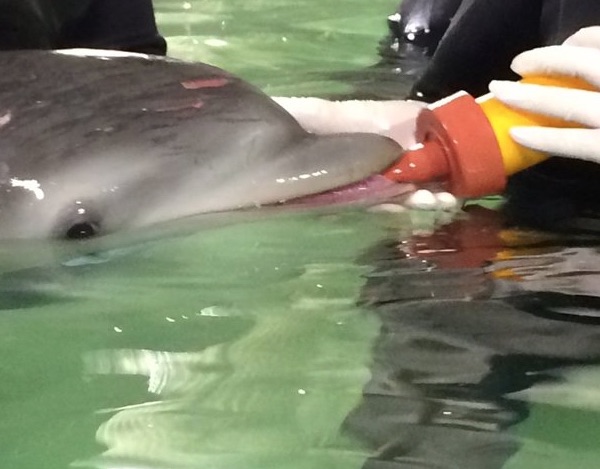
Baby Bea nurses from a bottle at the Texas State Aquarium’s Second Chances Rehabilitation Hospital in Corpus Christi. Bea died after seven weeks at SeaLab where she making progress, swimming on her own and responding to feeding cues. Courtesy Photo
A six-month-old bottlenose dolphin is being cared for by the Texas State Aquarium after being found in the surf at South Padre Island June 20. Animal workers are bottle feeding the 58-pound, 4-foot-long female calf at the aquarium’s Second Chances Rehabilitation Hospital in Corpus Christi.
Along with dolphin milk — a formula Sea World San Antonio helped the aquarium develop — the baby has been prescribed antibiotics to prevent pneumonia. Blood work was also done and lacerations along her body treated.
A full recovery is expected, say the experts at the rehab center, as the dolphin is now swimming freely in her tank and eating. Because of her age, rescue can be difficult, since she has not learned to hunt.
The youngster was transported to the aquarium by the Texas Marine Mammal Stranding Network. The network is a non-profit organization created in 1980 to rescue and study marine animals. It covers six regions along the Texas coast. Anyone spotting stranded marine animals should call the network at 800-962-6625.
The TMMST website offers a few tips on what to do to help stranded marine animals after making that call:
• Do not return the animal to the sea. Keep people and pets away while waiting for help to arrive. Do not leave the animal.
• Relieve pressure on fins by digging holes under them. Dig a pit under them and fill with water to relieve pressure on the lungs.
• Splash water on the skin to keep them cool, but avoid getting water in the blowhole.
• Wet towels or T-shirts applied along the body can also keep them cool. Do not cover the dorsal fin, flippers or tail.
• If the animal is in the surf, keep water out of the blowhole and try to bring it into shallow water. Keep it upright and in the water until help arrives. Watch out for the tail and mouth when around an injured animal.





